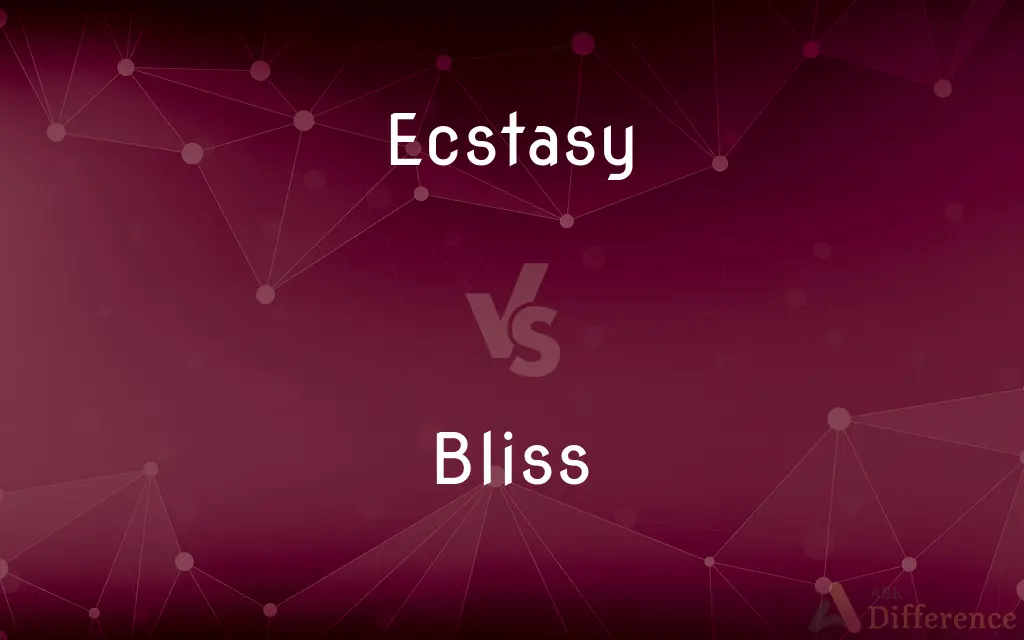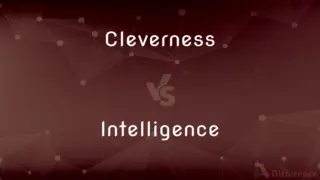Ecstasy vs. Bliss — What's the Difference?
By Maham Liaqat & Urooj Arif — Updated on April 8, 2024
Ecstasy often implies a temporary, intense emotional or spiritual high, while bliss denotes a deep, lasting state of perfect happiness and contentment.

Difference Between Ecstasy and Bliss
Table of Contents
ADVERTISEMENT
Key Differences
Ecstasy is typically experienced as a peak moment of intense joy or pleasure, often described as transcending normal emotional states. It can be triggered by various events or activities, including spiritual experiences, love, or the use of certain substances. Whereas bliss is characterized by a profound and enduring sense of well-being and fulfillment, not necessarily linked to specific moments or causes but rather a sustained state of contentment that permeates one's life.
Ecstasy is often associated with a loss of self-control or an overwhelming sensation that temporarily disconnects individuals from their current realities. This state can be so intense that it feels outside the scope of ordinary experience. On the other hand, bliss is usually associated with serenity and a deep connection to one's life and surroundings. It embodies a calm, collected state of happiness that integrates rather than separates a person from their sense of self or reality.
While ecstasy can be sought through external stimuli or activities that provoke extreme emotional responses, it is usually short-lived, with individuals returning to their baseline emotional state once the stimulating activity concludes. Bliss, in contrast, is often the result of internal peace, spiritual practices, or a deep sense of satisfaction with one's life that does not depend heavily on external circumstances.
The pursuit of ecstasy can sometimes lead to risky behaviors or dependency on substances or experiences that trigger this intense state, as individuals may seek to recreate or prolong the ecstatic experience. Conversely, bliss is generally achieved through balanced living, mindfulness, and a deep appreciation for one's existence, leading to a healthier and more sustainable state of happiness.
Ecstasy is often described in terms of peak experiences that stand out vividly against the backdrop of everyday life, making them memorable but isolated events. Bliss, however, is described as a steady undertone of joy that colors all aspects of life, making ordinary moments seem enriched and full of meaning.
ADVERTISEMENT
Comparison Chart
Nature
Temporary, intense emotion
Long-lasting, profound happiness
Source
External stimuli, activities, substances
Internal peace, satisfaction, spiritual practices
Effect on Self
Loss of self-control, overwhelming
Deep connection to self, serenity
Sustainability
Short-lived, dependent on external triggers
Sustained, independent of external circumstances
Pursuit Risks
Potential for risky behavior or dependency
Achieved through balanced living, lower risk
Compare with Definitions
Ecstasy
A state of overwhelming joy or enthusiasm.
She felt a sense of ecstasy as she crossed the finish line first.
Bliss
Deep and lasting peace and happiness.
After years of meditation, he found bliss.
Ecstasy
An intense emotion transcending normal feelings.
The ecstasy he felt during the concert was unmatched.
Bliss
Serene joy, not dependent on external factors.
She found bliss in the simple pleasures of life.
Ecstasy
A state induced by the consumption of certain drugs.
The drug MDMA is often associated with feelings of ecstasy.
Bliss
The highest degree of happiness.
Her smile was a symbol of the bliss she felt within.
Ecstasy
A peak spiritual or religious experience.
The mystic described her vision as a form of ecstasy.
Bliss
A state of spiritual blessedness.
The sage lives in bliss, unaffected by the world's turmoil.
Ecstasy
A moment of rapture or bliss.
Their wedding day was filled with moments of pure ecstasy.
Bliss
A state of perfect happiness and contentment.
Living in the countryside was pure bliss for them.
Ecstasy
Intense joy or delight.
Bliss
Perfect happiness; great joy
She gave a sigh of bliss
Ecstasy
A state of emotion so intense that one is carried beyond rational thought and self-control
An ecstasy of rage.
Bliss
Reach a state of perfect happiness, oblivious of everything else
Josh is just blissed out, always smiling
Blissed-out hippies
Ecstasy
The trance, frenzy, or rapture associated with mystic or prophetic exaltation.
Bliss
Extreme happiness; ecstasy.
Ecstasy
Often Ecstasy(Slang) MDMA.
Bliss
The ecstasy of salvation; spiritual joy.
Ecstasy
Intense pleasure.
Bliss
Perfect happiness.
The afternoon at the spa was utter bliss.
Ecstasy
A state of emotion so intense that a person is carried beyond rational thought and self-control.
Bliss
Orig., blithesomeness; gladness; now, the highest degree of happiness; blessedness; exalted felicity; heavenly joy.
An then at last our blissFull and perfect is.
Ecstasy
A trance, frenzy, or rapture associated with mystic or prophetic exaltation.
Bliss
A state of extreme happiness
Ecstasy
(obsolete) Violent emotion or distraction of mind; excessive grief from anxiety; insanity; madness.
Ecstasy
(slang) The drug MDMA, a synthetic entactogen of the methylenedioxyphenethylamine family, especially in a tablet form.
Ecstasy
A state in which sensibility, voluntary motion, and (largely) mental power are suspended; the body is erect and inflexible;
Ecstasy
(intransitive) To experience intense pleasure.
Ecstasy
(transitive) To cause intense pleasure in.
Ecstasy
The state of being beside one's self or rapt out of one's self; a state in which the mind is elevated above the reach of ordinary impressions, as when under the influence of overpowering emotion; an extraordinary elevation of the spirit, as when the soul, unconscious of sensible objects, is supposed to contemplate heavenly mysteries.
Like a mad prophet in an ecstasy.
This is the very ecstasy of love.
Ecstasy
Excessive and overmastering joy or enthusiasm; rapture; enthusiastic delight.
He on the tender grassWould sit, and hearken even to ecstasy.
Ecstasy
Violent distraction of mind; violent emotion; excessive grief of anxiety; insanity; madness.
That unmatched form and feature of blown youthBlasted with ecstasy.
Our words will but increase his ecstasy.
Ecstasy
A state which consists in total suspension of sensibility, of voluntary motion, and largely of mental power. The body is erect and inflexible; the pulsation and breathing are not affected.
Ecstasy
To fill ecstasy, or with rapture or enthusiasm.
The most ecstasied order of holy . . . spirits.
Ecstasy
A state of being carried away by overwhelming emotion;
Listening to sweet music in a perfect rapture
Ecstasy
A state of elated bliss
Ecstasy
Street names for methylenedioxymethamphetamine
Common Curiosities
What is ecstasy?
Ecstasy is a temporary state of intense joy, pleasure, or spiritual elevation, often induced by specific activities or substances.
Can ecstasy be a part of normal life?
Yes, moments of ecstasy can occur in normal life through experiences that deeply move or excite us.
Is bliss the same as happiness?
Bliss can be considered a deeper, more profound form of happiness that is more about inner peace and fulfillment.
What defines bliss?
Bliss is a deep, enduring state of joy and contentment, characterized by a profound connection to one's inner self and life.
How do ecstasy and bliss differ in source?
Ecstasy is often triggered by external events or substances, whereas bliss originates from inner peace and satisfaction.
How does one achieve bliss?
Bliss is typically achieved through mindfulness, spiritual practices, and a deep appreciation of life.
Can ecstasy be harmful?
While ecstasy can offer profound experiences, seeking it through risky behaviors or substance use can be harmful.
Is bliss more sustainable than ecstasy?
Yes, bliss is a more sustainable form of happiness that does not rely on external triggers and is integrated into daily life.
Can ecstasy lead to addiction?
Yes, continually seeking ecstasy through substances or certain behaviors can lead to dependency.
Can meditation lead to bliss?
Yes, meditation is one of the practices that can cultivate bliss through fostering inner peace and awareness.
Is it possible to experience both ecstasy and bliss?
Yes, individuals can experience both states, though they may come through different means and have distinct qualities.
Can bliss be achieved without spirituality?
Yes, bliss can be achieved through various means, including deep personal fulfillment and connection to life, not exclusively through spirituality.
What are the risks of pursuing ecstasy?
Pursuing ecstasy, especially through substances, can lead to health risks and dependency.
How do spirituality and religion relate to ecstasy and bliss?
Both states are often associated with spiritual and religious experiences, though ecstasy is more about momentary elevation, and bliss is about enduring peace.
How do external factors affect ecstasy and bliss?
External factors can trigger ecstasy, while bliss is less dependent on external circumstances and more on internal state.
Share Your Discovery

Previous Comparison
Cleverness vs. Intelligence
Next Comparison
Bracer vs. GauntletAuthor Spotlight
Written by
Maham LiaqatCo-written by
Urooj ArifUrooj is a skilled content writer at Ask Difference, known for her exceptional ability to simplify complex topics into engaging and informative content. With a passion for research and a flair for clear, concise writing, she consistently delivers articles that resonate with our diverse audience.
















































